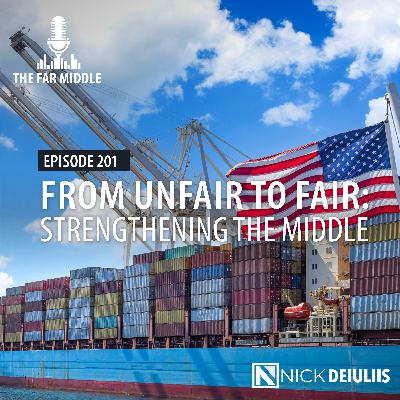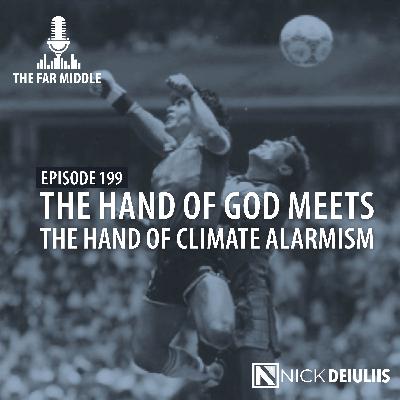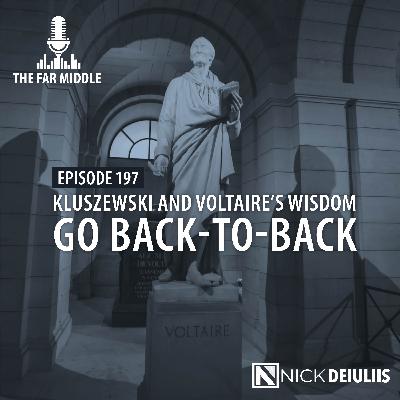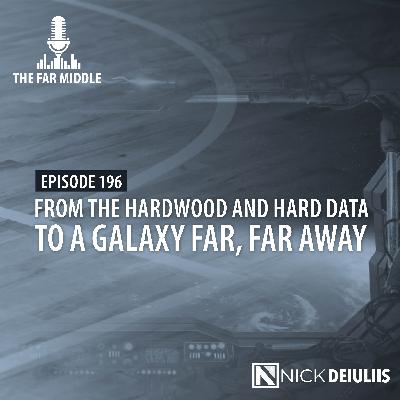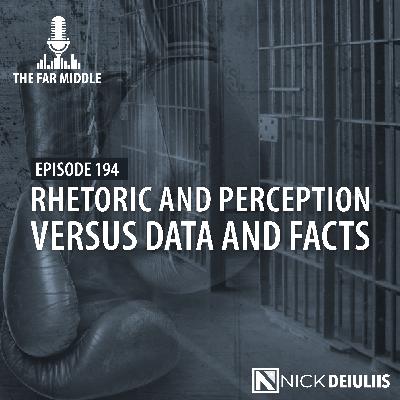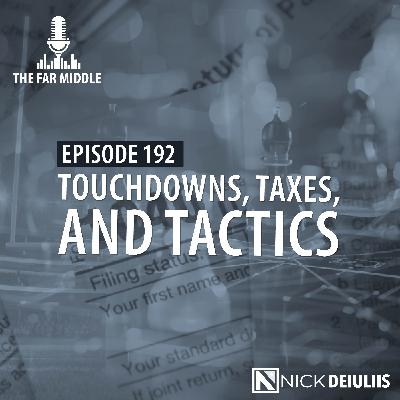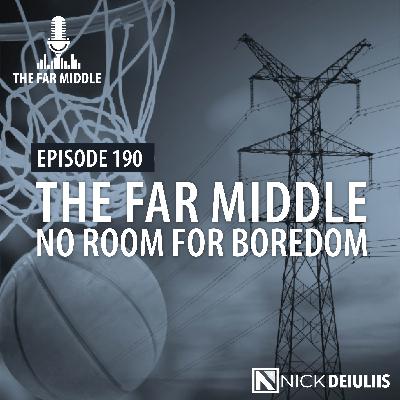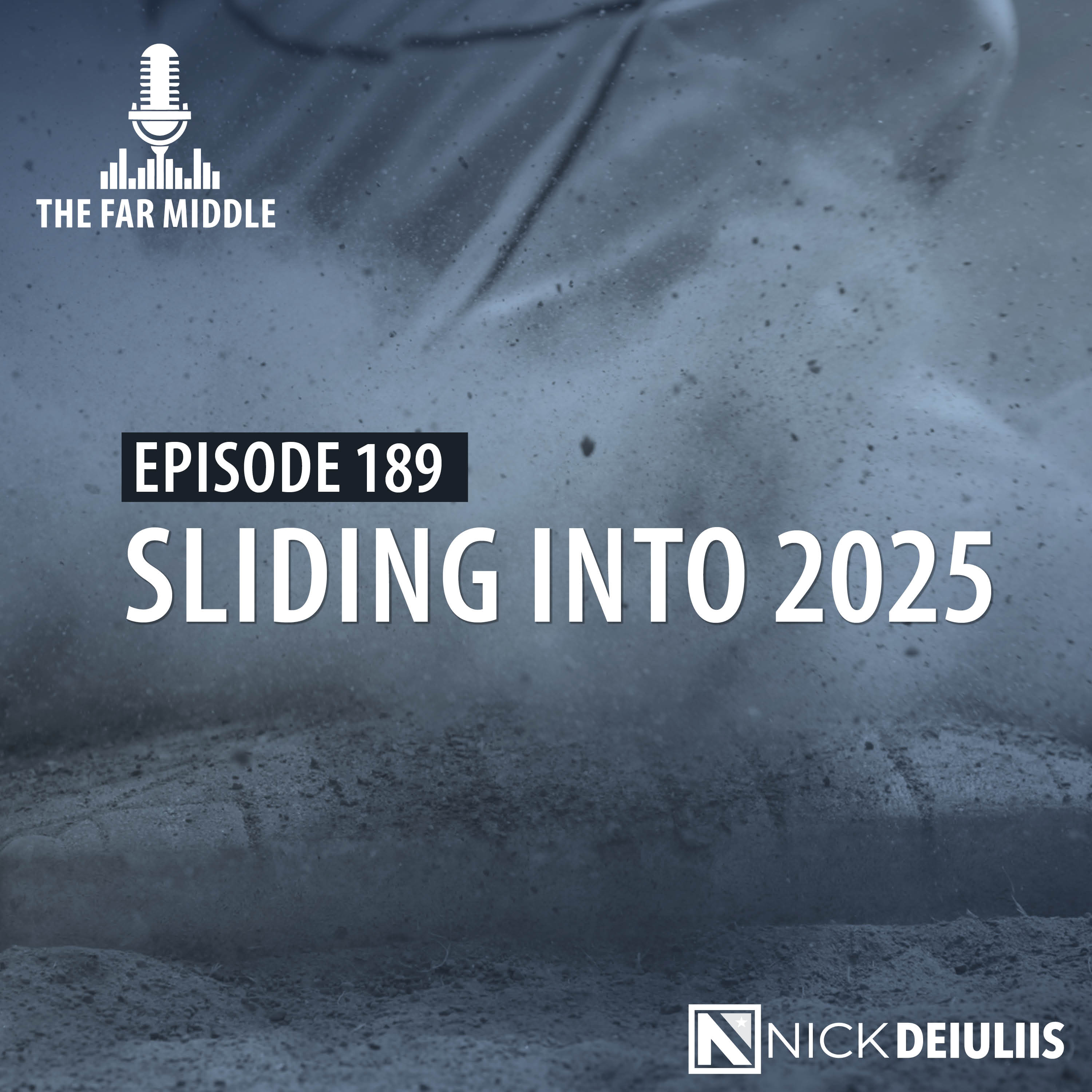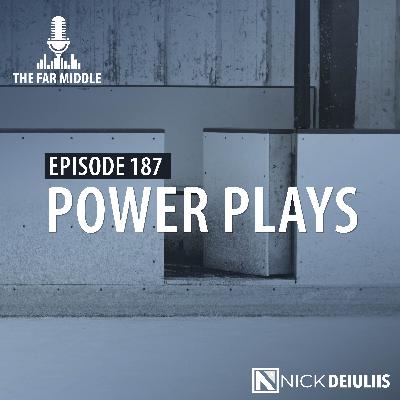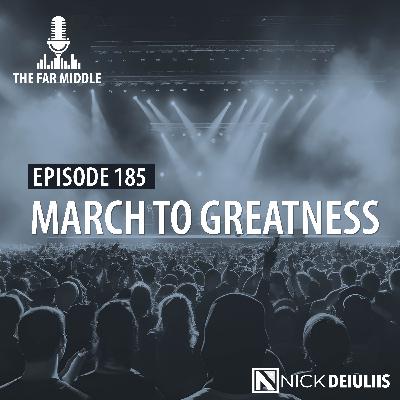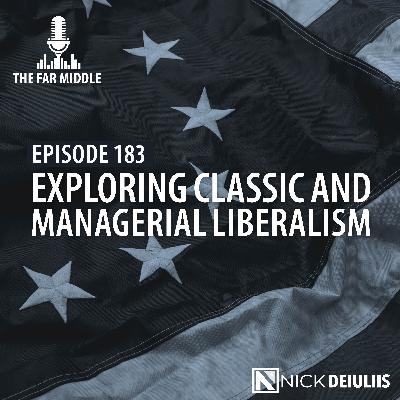Discover The Far Middle
The Far Middle

The Far Middle
Author: Nick Deiuliis
Subscribed: 14Played: 458Subscribe
Share
© 2021
Description
Tune in weekly to Nick’s Far Middle Podcast, covering a range of timely and interesting topics spanning business, energy, sports, culture, politics, and policy. Each installment of the Far Middle podcast offers an entertaining stroll through a variety of subjects that Nick ties together in a common theme at episode’s end. Never predictable, but always engaging, the Far Middle is a must-listen for those looking for straight talk in a world of facade.
201 Episodes
Reverse
In episode 201 of the Far Middle, Nick returns under the series’ new, flexible release schedule to discuss a pressing and timely topic: U.S. trade tariffs and their implications for the American economy, the middle class, and particularly the Appalachian region.
Nick frames the discussion through the lens of CNX Resources’ core values-ownership, responsibility, and excellence-emphasizing CNX’s longstanding commitment to the Appalachian community and its "Appalachia First" approach. These values are critical in addressing the region’s challenges, which stem from decades of policies that have harmed local communities, domestic energy, and American workers.
The episode centers on the recent shift in U.S. trade policy, particularly the imposition of reciprocal tariffs by the Trump administration. Nick underscores that his support for tariffs is not partisan but rooted in a desire for rational trade policy.
Critics-especially in legacy media and academia-have mischaracterized the Trump administration’s moves on tariffs as economic suicide, ignoring the reality that the U.S. has long operated under a regime of unfair trade as asymmetrical tariffs disadvantage American industries and workers.
Explaining the differences between free trade, unfair trade, and fair trade, Nick contends that while free trade is ideal, moving from unfair to fair trade-where tariffs are symmetrical-is a necessary and pragmatic step towards free trade.
Nick also explores the societal and economic consequences of unfair trade, describing a "barbell" distribution where wealth accrues to the elite while the middle class erodes and poverty grows. Shifting to fair trade via reciprocal tariffs can help rebalance this distribution, resurrecting the middle class by incentivizing domestic manufacturing and onshoring jobs. This not only strengthens national security and reduces reliance on adversarial nations but also helps lowers carbon emissions due to higher U.S. environmental standards.
Further, Nick examines how the move to fair trade will create new winners-such as domestic manufacturers, energy producers, and middle America-while reducing the power of legacy media, coastal elites, and sectors reliant on globalization. He cautions, however, that the transition from unfair to fair trade will be neither quick nor smooth, and that higher-than-reciprocal tariffs could perpetuate unfairness if not used as a negotiating tool.
In closing, Nick encourages listeners to "bet on America," invest in domestic energy and Appalachia, and remain patient and optimistic about the long-term benefits of a rebalanced trade policy.
In milestone Far Middle episode 200, Nick reflects on the series’ nearly four-year history and announces upcoming format changes. “Like all good things in life, evolution is part of the process and journey toward continuous improvement,” says Nick. Despite upcoming changes in format, the Far Middle’s mission and message are built to last.
Similarly built to last, and a fitting sports dedication for a landmark episode, Nick celebrates America’s iconic sports statues that dot cities across the country and provide a legacy for future generations to know and recall their cities’ sports greats.
While such a tribute could fill a three-hour-plus Far Middle discussion (maybe someday it will), Nick proceeds to highlight his “Mount Rushmore of sports statues in the Steel City.”
The four honorees include Pirates legend Honus Wagner (dedicated in Far Middle Episode 137), 1960 World Series hero and Hall of Famer Bill Mazeroski, the great Roberto Clemente (dedicated in Episode 21), and prolific Penguin Mario Lemieux. Le Magnifique is among a select group of multi-featured dedications. Including, of course, Super Mario’s feature in Episode 66, as well as his 1992–1993 season spotlight in Episode 93.
These statues—crafted by artists like Susan Wagner (Mazeroski, Clemente), Frank Vittor (Honus Wagner), and Bruce Wolfe (Lemieux)—symbolize Pittsburgh’s rich sports legacy while immortalizing both athletic greatness and the sculptors who transformed history into bronze.
Nick then revisits the Far Middle’s origins as a companion to his book Precipice: The Left’s Campaign to Destroy America, which evolved into a standalone platform for rational discourse on policy, culture, and current events.
Across its four-year run, the show has regularly tackled topics like administrative overreach, climate policy, education, geopolitics, and capitalism, consistently advocating for “the doers” – working-class innovators and flyover America – while critiquing elitism and ideological policymaking.
Key pillars of The Far Middle’s ethos include:
Defending individualism against the tyranny of the majority and the wisdom of the elite experts.
Promoting civil discourse even amid polarizing topics.
Championing capitalism as the optimal economic system: “It's not perfect, far from it, but it's the best economic system to elevate the human spirit we've come across in history,” says Nick.
Prioritizing data-driven analysis over emotional or speculative arguments.
Announcing a major format shift, Nick reveals the podcast will transition from weekly 25-minute episodes to a less frequent, deeper-dive format. New episodes will focus on single themes (e.g., history, science, music) with supplemental visuals or companion articles, aiming for “predictably unpredictable and uniformly unconventional” explorations.
The evolution mirrors bold reinventions in rock history, prompting Nick to present his “Magnificent Seven” of rock acts that successfully reinvented their style to achieve new heights. Those artists include Genesis, U2, and Bob Dylan, but you’ll have to...
As the Far Middle approaches its 200th episode, Nick begins with the series’ first sports dedication to honor a soccer great. That legend is Diego Maradona, whom Nick describes as the most dynamic, charismatic, and clutch athlete in soccer history.
Nick recounts Maradona's humble beginnings in Buenos Aires, his rise to stardom, and his iconic transfer from Barcelona to Napoli in 1984, which resonated personally for Nick given his family roots in Naples. Maradona's arrival transformed Napoli from an underdog southern Italian club into champions, symbolizing a victory for the working class against wealthier northern teams. Despite Maradona's off-field controversies—including drug issues and alleged mafia connections—Naples maintained deep affection for him, eventually renaming their stadium in his honor.
Highlighting Maradona's ascent to mythical status at the 1986 World Cup, Nick recalls his controversial 'Hand of God' goal and another widely considered the greatest goal in World Cup history, both from the quarterfinal match against England. While admiring Maradona's unparalleled talent on the field, Nick also critiques his Leftist political leanings and associations with controversial figures like Fidel Castro and Nicolás Maduro.
From Maradona's undeniable soccer greatness, Nick connects to climate alarmism within sports journalism. He examines an article asserting soccer faces threats from climate change, criticizing the piece’s lack of evidence and sensationalist tone. Initiatives like stadium solar arrays, batteries, and relying on wind-powered electricity are more about virtue signaling than genuine environmental benefit, and they often result in higher actual carbon footprints compared to conventional energy sources.
Continuing to address the realities of affordable and reliable energy, Nick next highlights a recent editorial from author Bjorn Lomborg, “Green Energy Costs a Bundle.” Citing examples from Germany and other European countries, Nick shows how greater reliance on renewables leads to higher electricity costs and less reliable energy supplies. He also explains how subsidies mask the true cost of renewables in the United States, advocating for transparency and efficiency reforms.
And as the waning seconds of extra time in episode 199 tick away, Nick connects back to the episode’s soccer start, recommending the 1981 film "Escape to Victory." Starring Sylvester Stallone, Michael Caine, Max von Sydow, Pelé, and other professional soccer players, the movie is set in World War II and centers on Allied POWs playing a soccer match against German opponents amidst escape plans and propaganda schemes. “The ending is great,” says Nick without revealing any spoilers. “You’ll have to watch it to see it.”
In Far Middle episode 198, Nick opens with a tribute to one of the NFL’s most violent games—the early November 1984 matchup between the Chicago Bears and Oakland Raiders.
The game featured Buddy Ryan’s “46 Defense” thatfocused on relentless quarterback pressure (exemplified by their 11-sack performance against Archie Manning the prior week). That pressure led to Raiders’ quarterbacks Mark Wilson (knocked out twice) and David Humm (incurring a career-ending injury) exiting the game. The Raiders’ emergency, third-string quarterback and punter, Ray Guy, refused to enter the game, fearing injury.
On the other side of the battle, resembling “World War I trench warfare,” Bears’ quarterback Jim McMahon played through a game-suffered lacerated kidney. McMahon and the Bears prevailed 17-6, but moreover the game symbolizes a bygone era of raw physicality. Contrasted to today’s offense-driven, safety-conscious NFL, Nick calls it a “world where a Tom Brady or a Lamar Jackson wouldn't have a chance of being the greats that we've had the pleasure of seeing them become.”
Next, Nick dives into a series of connections and great trends in history, specifically trends identified and articulated by American historian Daniel J. Boorstin (1914–2004). Boasting a resume that includes distinguished author and Pulitzer Prize winner, Librarian of Congress from 1975 to 1987, renowned historian, college professor and more, Nick proceeds to explore Boorstin’s theories and work, including:
Consensus History: Emphasizing American unity over class conflict and celebrating inventors and entrepreneurs as societal pillars.
Creators vs. Discoverers: Creators (artists, musicians) forge new paths without linear progress. Discoverers (scientists, explorers) build incrementally on collective knowledge. And the observation that discoverers, like Christopher Columbus, receive individual credit for collaborative efforts. Meanwhile creators like Led Zeppelin are grouped into “schools” that obscure their individuality.
The Convergence of Technology with Political History: The U.S. Constitution, Boorstin argues, emerged not from divine inspiration but from practicality. Printed drafts allowed 55 delegates to debate and refine ideas—a process impossible without the era’s nascent printing technology. Even America’s discovery, Nick adds, was a “happy accident” born of Europe’s quest for Asian trade routes.
An example of Boorstin’s view on creativity and knowledge is encapsulated in his line from The Discoverers (1983). He writes, “The great obstacle to discovering the shape of the earth, the continents, and the oceans was not ignorance but the illusion of knowledge.”
In closing, Nick offers a playful yet profound coda: Ross Bagdasarian, the Armenian-American creator of Alvin and the Chipmunks. A Broadway actor, Hitchcock film extra, and hit songwriter, Bagdasarian epitomized Boorstin’s “creator-inventor” hybrid. His sped-up vocals birthed a cultural phenomenon, proving innovation often thrives at the intersection of art and unconventional experimentation. And what is Nick’s favorite Chipmunks album? Press play and find out!
For more on the Chicago Bears’ defense, see where the 1985 squad lands on Nick’s “Ten Greatest NFL Defenses in the Super Bowl Era.”
As Far Middle episode 197 arrives with Cactus and Grapefruit League play underway, Nick opens with a fitting baseball dedication to legendary Cincinnati Red, Ted Kluszewski, aka “Big Klu.”
Nick highlights Big Klu’s four ingredients for success—ability, confidence, work ethic, and the will to win. Those ingredients transcend baseball and apply to professional success no matter one’s career path.
Nick shifts from the power hitter’s insights of the 1950s to Voltaire’s wisdom from the 1700s. Nick proceeds to explore Voltaire's Alphabet of Wit, a collection of short essays offering timely commentary on many issues society faces today.
For those unfamiliar with Voltaire, Nick explains he was one of history’s great writers, and a prolific one as well, authoring approximately 20,000 letters and over 2,000 books and pamphlets. And his Alphabet of Wit is a perfect, condensed introduction to Voltaire’s philosophy and genius.
In Alphabet of Wit, Voltaire presents an alphabetical series of short and insightful essays examining words/terms from A to Z, from animals to eloquence, from morality to slavery, and more. Here are just a few of Nick’s observations:
Books: Voltaire lamented that despite their abundance, few people invest the time to read—a problem amplified today.
Government: Voltaire mocked humanity's obsession with governing despite its perpetual incompetence, a critique that resonates with modern bureaucratic inefficiency.
Happiness: True joy, Voltaire argued, stems from disposition, not circumstance-a reminder for today's pursuit of contentment.
Right: Voltaire's critique of paper currency (“a sham for real wealth”) parallels modern critiques of central banking, while his observations on religious institutions resonate with current debates on institutional power.
Nick also discusses Voltaire's perspective on self-love, which echoes the philosophy of Ayn Rand, particularly her concept of rational self-interest. In exploring Voltaire’s view on war, Nick notes that Voltaire's take that leaders should exhaust all alternatives before resorting to conflict resonates strongly today.
In closing, Nick connects Voltaire’s discussion of the alphabet and language to L.L. Zamenhof's Esperanto, a constructed language developed in the late 1800s intended to promote peace and understanding. Though it failed to achieve widespread adoption, Esperanto serves as a reminder of humanity's ongoing quest to bridge divides and foster lasting connection.
Episode 197 is another masterful set of connections, spanning Kluszewski’s ingredients for success to Voltaire’s wit, stressing reason and timeless wisdom to navigate modern complexities.
In Far Middle episode 196, Nick starts with a blend of basketball history and intrigue for the installment’s sports dedication—recounting how basketball giants Red Auerbach and Wilt Chamberlain met back in the summer of 1954.
Nick explains how Chamberlain and Auerbach’s paths crossed as player and coach at a country club in Monticello, NY. He reflects on the clash between the young, headstrong Chamberlain and the up-and-coming Coach Auerbach.
For more on Coach Auerbach, revisit Far Middle episode 119 for Nick’s tribute to the legendary coach and executive. And for more commentary on Chamberlain, see episode 152 and episode 69 which honors the 69-win NBA season by the 1971-72 Los Angeles Lakers.
Transitioning from the hardwood to hard economic issues, Nick explores the possibility of the new administration getting serious about fiscal responsibility and the need to balance America’s budget. Nick explains, “The levers in the end are indeed simple. You can raise taxes to increase revenues. That's one option. You can cut spending by government. There's a second one. Or you can scale back entitlements. And each lever, although simple, brings to bear many complexities in endless policy debates.”
Inspired by Thomas Sowell, Nick discusses an additional lever, which is the potential of selling federally owned land. He notes the concept isn’t new, and the move could not only generate revenue but also reduce maintenance costs and stimulate economic growth.
The episode then shifts to a curious contradiction: the decline of religious practice in America despite centuries of religious freedom. Drawing from recent studies and exit polls from the 2024 election, Nick points out the growing number of religiously unaffiliated Americans and how faith seems to correlate with political preferences.
Next, Nick dives into the impact of inflation over the past four years, presenting a sobering list of rising prices across multiple sectors, from car insurance to airfare and from gas to groceries. This leads to a critique of price controls as a solution to inflation, with Nick citing the work of Henry Hazlitt and Brian Wesbury in, The Dangers of Price Controls.
“Movement toward a dictated and authoritarian economy is never a good thing,” says Nick. “It takes freedom away from the individual business entity and worker and places power in the hands of government. Bad move under any circumstance and price controls are never a cure for inflation, despite how they are marketed.”
Nick further underscores that the complexity of our economy makes price controls impossible. He also addresses the root cause of inflation, which is the growth of America’s money supply since 2008.
In closing, Nick offers a tribute to “the greatest name in science fiction writing and film screenwriting that you never heard of.” That writer is the acclaimed Lee Brackett, a pioneering science fiction writer and screenwriter often overlooked despite her significant contributions. Nick describes Brackett as one of the most prominent female writers during the golden age of science fiction.
Nick touches on Brackett’s extensive resume and career highlights, which includes writing and co-writing many films (including The Big Sleep that starred Humphrey Bogart and Lauren Bacall), working on Westerns alongside director Howard Hawks, and much more. One of her last works and her final scre...
As spring training gets underway during the premiere week of Far Middle episode 195, Nick leads off with a timely and heartfelt dedication to one of baseball’s greatest leadoff hitters—the late, great Rickey Henderson.
Nick recalls Henderson's distinctive style and personality, including his crouched batting stance and his tendency to refer to himself in the third person. Reflecting on Henderson's record-breaking career, Nick highlights his unmatched stolen base prowess, which rightfully earned him the nickname “Man of Steal.”
Leaving the diamond, Nick delves into the writings of Ayn Rand. He examines her thoughts on civil discourse and advocacy, emphasizing their relevance to the challenges of today's political landscape. Rand's focus on well-reasoned arguments and the importance of clarifying ideological divides provides an important framework for analyzing contemporary issues.
Nick highlights Rand’s quote from her essay Conservatism: An Obituary: “Nothing is as futile as a movement without goals, or a crusade without ideals, or a battle without ammunition. A bad argument is worse than ineffectual: it lends credence to the arguments of your opponents. A half-battle is worse than none: it does not end in mere defeat—it helps and hastens the victory of your enemies."
To illustrate Rand’s argument, Nick critiques a recent Wall Street Journal article on energy policy. He examines flaws in the article’s logic and rebuts its assumptions, raising concerns about bias and a lack of rigor in business media reporting, particularly regarding energy and climate issues.
Shifting from Rand’s wisdom to insights from The Heritage Foundation’s Kevin Roberts, Nick explores Roberts’ essay Populist Conservatism and Constitutional Order. Nick highlights Roberts’ observation that “the Left as we know it today has rejected populism out of hand, embracing instead Big Government, Big Business, Big Banks, Big Tech, Big Pharma, Big Labor, Big Ag, Big Media, and Big Entertainment.”
Roberts includes a quote by composter Gustav Mahler, “Tradition is not the worship of ashes, but the preservation of fire.” Nick reflects on this important message, which he says has been true since the Enlightenment and is central to the Far Middle’s mission.
Ending on a high note, Nick offers a tribute to legendary guitarist Joe Walsh while acknowledging Walsh’s omission from Nick’s list of top rock guitarists. He delves into Walsh’s musical journey beyond the Eagles, spotlighting his influential album So What and his contributions to rock history. Tune in to not only hear Nick’s favorite Joe Walsh song but to learn more about Walsh which will likely have you searching Spotify for Rocky Mountain Way.
Far Middle episode 194 is another exploration of multiple interconnected topics, beginning with a tribute to Constantine "Cus" D'Amato, a legendary boxing trainer and mentor.
D'Amato's life story is remarkable. From his humble and rough beginnings in the Bronx to becoming a transformative figure in boxing, Cus went on to train champions such as Floyd Patterson and Mike Tyson while developing the innovative "peek-a-boo" boxing technique. “You won't find a figure who had more of an impact on boxing, who loved it more, and who was dedicated to it more, and whose career spanned a longer time than that of Cus D'Amato,” reflects Nick.
Stepping out of the ring, Nick observes how many issues today, particularly those revolving around policy, seem to rely on the faith of rhetoric and perception versus data and facts. He proceeds to analyze criminal justice statistics, challenging popular perceptions about mass incarceration.
Contrary to common narratives, the U.S. prison population has been declining for 15 years, with only 17% of prisoners being drug offenders and most inmates being violent criminals or repeat offenders. Nick examines how the increased incarceration rate since 1960 is attributable to higher crime rates and improved criminal justice system effectiveness, not necessarily harsher sentencing.
Continuing to focus on the data, Nick then examines federal anti-poverty programs, exposing their inefficiency. In 2023, the government spent $29,402 per person in poverty, with total federal outlays exceeding $1 trillion. Despite this investment, poverty remains largely unaddressed, highlighting government’s systemic ineffectiveness.
Shifting to social media’s impact on political discourse, Nick draws parallels between Franklin D. Roosevelt's fireside chats with Donald Trump's use of X/Twitter. He critiques left-leaning calls for social media regulation, framing it as an attempt to control narrative and information flow.
In closing, Nick offers a philosophical reflection on species extinction, noting that 99.99% of all species that ever existed are now extinct, and humans have been around for approximately 4 million years - coincidentally the average lifespan of complex species.
Throughout the episode, Nick underscores the importance of examining facts and data rather than relying on rhetoric and perception.
For related commentary on the importance of facts and data, revisit Far Middle episode 173, “Data Driven Truth,” where Nick highlights CNX Resources' Radical Transparency initiative. And if you missed episode 137, “The Fellowship of Data and Facts,” listen as Nick examines the actual data on Western Pennsylvania’s air quality, in addition to examining the Institute for Energy Research’s Environmental Quality Index, as well as the unsettling state of America’s finances.
In Far Middle episode 193, Nick follows up last week’s dedication to the American Football League with a timely tribute to legendary NFL coach Bill Belichick.
Belichick, known for his six Super Bowl wins as head coach of the New England Patriots (plus two more as defensive coordinator with the New York Giants in Super Bowls XXI and XXV), recently surprised many, including Nick, by accepting a position as head coach at the University of North Carolina. However, given Belichick's NFL success and passion for the game, Nick suggests that perhaps the eight-time Super Bowl champ is looking to take on a new challenge as a head coach at the college level.
From Coach Belichick’s Super Bowl victories, Nick connects to President Trump’s victory this past November and subsequent inauguration last week. He highlights the new administration's focus on improving government efficiency and reducing both the administrative state and regulations. “It’s exciting to someone like me who is a combo of libertarian, socially liberal, and fiscally conservative,” explains Nick.
Nick references polling results that indicate most American voters are more concerned about government interference in private affairs than the dangers of capitalism and free markets. He says it’s time for tangible action to put Americans’ fears to rest by reining in the administrative state so that it falls within bounds more in line with reasonableness and our Constitution.
Next, Nick discusses needed reforms at the National Institutes of Health (NIH), including linking research grants to academic freedom rankings and addressing issues of research fraud.
“Elite academia and the scientific research that it performs are mired in a culture of conformity, one that ostracizes dissenting views or unconventional thinking from the consensus,” says Nick. “We see that occurring across every imaginable arena of scientific research, and then we see that research setting every imaginable arena of policy.”
The conversation then turns to education, discussing Thomas Jefferson High School in Virginia and its financial connections to China. Nick explains how the school's curriculum and model have been copied in China, raising concerns about technology transfer and educational partnerships.
The episode also revisits retirement and workforce trends (discussed in episode 192), using an anecdote about an American retiring in Belgium to illustrate demographic challenges facing developed nations. Nick stresses his concern about “the system” incentivizing early retirements and the impact on workforce productivity and economic competitiveness.
In closing, Nick celebrates Motown icon Smokey Robinson, detailing his career achievements, songwriting credits, and immense impact on the music industry. He also notes Robinson’s lifelong friendship with Aretha Franklin. For more on Franklin, check out Nick’s four favorite singles from the Queen of Soul at the close of episode 111.
Far Middle episode 192 arrives as most of the US shivers amidst a polar vortex. Nick begins by coincidentally noting that 54 years ago tomorrow marks the day when Prospect Creek Camp, Alaska, experienced the lowest temperature ever in the United States, -80 degrees.
Beginning this week’s connections, Nick shifts from bitter cold to the intense heat of the march to Super Bowl LIX as only four teams remain. With less than three weeks until Super Bowl Sunday, Nick offers this episode’s sports dedication to the American Football League (AFL).
The AFL operated from 1960 to 1970 before merging with the National Football League (NFL). While the fourth major attempt to compete with the NFL, Nick explains the factors and tactics that led to the AFL’s success; its exciting, offense-oriented style of play alongside TV contracts helped the league survive and eventually thrive. The AFL's history includes football legends like Joe Namath and Pete Rozelle, who were honored in previous Far Middle sports dedications (episodes 106 and 146).
Nick then shifts to a frequent Far Middle subject, tax policy. “With so much talk these days centered around making sure that individuals and businesses, particularly those making the most, pay their fair share of tax, I thought it would be interesting to move away from the rhetoric and focus on the objective math,” says Nick.
Looking at the federal tax system and its progressive structure, Nick notes that in 2022, the top 1% of income tax filers provided over 40% of federal tax revenue, while the top 10% shouldered over 70% of the total tax burden.
“Yeah, the reality is that one filer out of every hundred is providing more than 40% of income tax revenue,” says Nick. “And that top 1% is about one-and-a-half million tax returns. That group comprises over 22% of the nation's total reported earnings.”
On the topic of paying one’s fair share, Nick also analyzes the tax-exempt status of large non-profit organizations. He points out that in 2019, tax-exempt nonprofits generated over $3 trillion in income and held $8 trillion in assets.
The episode concludes with a discussion of global demographic trends, comparing and contrasting China's response to the declining working-age population to that of Japan, Europe, and the United States. He highlights China’s Belt and Road Initiative, which is helping solve its demographic problems while also expanding its global influence.
As time expires on episode 192, Nick shares his appreciation for the 1970s TV show "Barney Miller” (which premiered 50 years ago this week) and follows with a closing thought on personal motivation by referencing a line from Ayn Rand’s The Fountainhead.
Nick opens Far Middle episode 191 with a sports dedication highlighting a sport that’s evaded the podcast series’ nearly four years (and counting) run of tributes.
Nick heads back to 1972 to celebrate that summer’s World Chess Championship match between Bobby Fischer and defending champion Boris Spassky of the Soviet Union—dubbed the "Match of the Century" (not to be confused with “The Mile of the Century” highlighted in episode 168).
The historic confrontation, held in Iceland, saw Fischer become the first American-born world chess champion, ending 24 years of Soviet chess dominance. Nick examines Fischer's eccentric behavior, unpredictable playing style, strategies, and Fischer’s life following the unprecedented win.
Beginning the episode’s connections, Nick shifts to the cold hard truth in refuting President Biden’s assertion that extreme heat is the leading weather-related killer in the US.
From the Oval Office, Nick connects to the judicial branch to discuss Supreme Court Justice Neil Gorsuch's book "Overruled: The Human Toll of Too Much Law," which critiques the voluminous growth of regulations in the US. He highlights Justice Gorsuch’s anecdote about a magician needing a license for a rabbit to illustrate the absurdity and cumulative onslaught of the bureaucratic state. This leads to a broader discussion on the concept of natural law, “some of its core characteristics,” and its influence on the US Constitution and Declaration of Independence.
Nick then delves into Russian influence on Western environmental movements.
“Russia and its controlled interests have been large funders and backers and supporters of the Western environmental movement, particularly with respect to anti-fossil fuel and anti-fracking groups,” says Nick. “It's true, even if it sounds like something out of a Hollywood conspiracy thriller.”
Russia’s manipulation of public opinion also extends to recent protests against a lithium mine in Serbia, which would threaten Russia’s energy dominance over Europe. Staying on foreign policy, Nick addresses the United Nations' "Pact for the Future" and "UN 2.0" initiative, and the power they give to global institutions. Nick describes UN 2.0 as scarier than the original UN monster and praises Argentina's President Milei for opposing these measures.
Nick highlights President Milei’s recent speech before the UN General Assembly, where the president called the UN "a multi-tentacled Leviathan that seeks to decide what each nation state should do and how the citizens of the world should live."
On the topic of disinformation and misinformation, Nick looks at Wikipedia's role in shaping public perception, discussing how Vice President Harris's role as "border czar" was manipulated on the platform.
In closing, Nick returns to the episode’s opening topic of chess to discuss the musical Chess, which was inspired by the Bobby Fischer vs. Boris Spassky match. The production’s music was written by Benny Andersson and Björn Ulvaeus of ABBA and notes "One Night in Bangkok” is featured on the 18-track album. “Stay humble over this coming week until we convene again, and always stay connected to that far middle,” says Nick signing-off.
In Episode 190 of The Far Middle, Nick once again takes “constant listeners” on a journey through a string of connections in the spirit of Dr. James Burke’s Connections television series. The discussion tips-off with a sports dedication highlighting the fascinating story about how NBA legend Bob Cousy unexpectedly became a Boston Celtic.
Despite being passed over in the 1950 NBA draft by the Celtics' coach Red Auerbach, Cousy ended up with the team through a series of unlikely events. After being drafted by Tri-Cities and traded to the Chicago Stags, which went bankrupt, Cousy's fate was decided by a random draw from a hat. The Celtics, who initially didn't want him, were forced to take him, inadvertently acquiring one of the greatest players in NBA history (including six NBA championships, 13 consecutive All-Star selections, led the NBA in assists for eight straight seasons, and more).
“Fate can have a sense of humor as well as a sense of irony,” says Nick. “So Episode 190 is dedicated to how Bob Cousy became a Celtic, proving truth in the adage that sometimes it is indeed better to be lucky than good.”
Nick then shifts to more serious matters, beginning with the ongoing war in Ukraine. While reaffirming his support for Ukraine against Russia, he criticizes Western media's portrayal of the conflict. He highlights Ukraine's challenges in mobilizing young men for military service, noting the disproportionate burden on rural areas for conscription and the need for Ukraine to demonstrate self-help to maintain Western support.
Turning to domestic issues, Nick recounts the killing of an airport executive in Little Rock, Arkansas, by ATF agents during a raid related to firearm sales. He also comments on the case of "Peanut the Squirrel" in New York, where state agents killed a pet squirrel due to licensing issues. These incidents are further examples of continued government overreach, “the threat of omnipotent government is greater than most Americans realize,” says Nick.
From the growing power of government’s overreach, Nick shifts to a warning of a potential energy crisis in the United States as he cites grid regulators’ concerns over power generation retirements. Nick looks back at the past decade of damage done to our collective energy security: “Every time you heard energy transition, net zero, clean energy or tackling climate change, that was code oftentimes for forcing the retirement and abandonment of ‘reliable’ on the grid, which is coal, nuclear, natural gas power plants, and mandating their replacement with the ‘unreliables’ of wind and solar, which was coupled to coincide with a mandated electrification of everything.”
The push for so-called net-zero carbon emissions in the power sector is not only impractical, but is threatening grid stability and by extension our energy and economic security.
Nick concludes by criticizing mainstream media for failing to report on government overreach, ignoring Ukraine's internal challenges, and not covering the potential energy crisis. Instead, media focuses on trivial matters like reducing or eliminating homeowners’ lawns.
In closing Nick notes the episode’s January 8 premiere date falls on both Elvis and David Bowie’s birthdays. He references a couple great Bowie quotes, including, “I don't know where I'm going from here, but I promise it won't be boring.” Stay connected to the Far Middle, as there’s never room for boredom!
For prior Celtics’ tributes, listen to Nick’s dedications to Red Auerbach, John Havlicek, and
As the Far Middle enters 2025, this New Year's episode examines the evolving economics of baseball, comparing the 1954 New York Giants with today's San Francisco Giants.
Nick explains how baseball in the 1950s was a modest business, with the Giants needing about $2.5 million to break even. Gate admissions were the primary revenue source, and player salaries accounted for only 30% of expenses. Fast forward to today, and the Giants' revenue exceeds $400 million, with TV rights alone surpassing $140 million. Player salaries now consume about half of the team's revenues, often as guaranteed money.
The evolution of Major League Baseball, from small to big business, ties into the episode’s theme of what was, what is, and what’s ahead with the start of the new year. Nick looks at several winners and losers from 2024 and forecasts trends for 2025.
From today’s wildly high baseball salaries, Nick draws a parallel to the expansion of federal entitlement programs and the dire need to rein in government spending.
“As we enter 2025, it is governing time, at least for President Trump and Congress,” says Nick. “And although I doubt we will see any changes or reductions in benefit to current recipients, I'm betting that you will see action on attempts to arrest spending to current levels and then to grow the economy so the entitlements become a smaller portion of the total budget pie. It's an absolute must if we want to avoid government default and economic calamity.”
Government regulation comes under scrutiny next, with Nick predicting potential setbacks for oppressive regulations in 2025—to the benefit of doers and value creators across America’s private sector. Nick cites The Harmonized Tariff Schedule, a monster 4,392-page document, as an example of complex regulatory excess that needs to be simplified.
The conversation then connects to constitutional issues, celebrating the Constitution's resilience in 2024 and anticipating its continued rise in the coming years. Nick quotes Calvin Coolidge's 1926 address marking the 150th anniversary of the Declaration of Independence to emphasize the Constitution’s enduring principles.
International events from 2024 are also highlighted, including Venezuela's 2024 election and Nicolas Maduro's refusal to acknowledge the results. Nick predicts challenges for authoritarian regimes in 2025, citing America's renewed global leadership and energy independence.
The Russia-Ukraine conflict is also analyzed, with Nick providing historical context and suggesting that 2025 may present an opportunity for peace negotiations. Nick calls for a realistic approach to ending the conflict, even if it means compromising on territorial issues.
Finally, Nick calls out the credibility of the United Nations, specifically its Relief and Works Agency for Palestine Refugees in the Near East (UNRWA).
“We shouldn't just stop funding the UNRWA, we should stop funding the UN until it can demonstrate material reform consistent with its original charter,” says Nick. “Last year proved to be a bad year for the United Nations. Let's hope it takes that as a warning to improve its reputation and standing this year. But I'm not holding my breath.”
In closing, Nick discusses the differing accounts of the origin of the song "Blue Suede Shoes." It's one for the money, two for the show, three to get ready, now go, cat, go…off to a great 2025.
In this special holiday Far Middle installment, Nick begins by looking back on the Christmas Truce of 1914 during World War I.
The remarkable event saw widespread unofficial ceasefires along the Western Front with soldiers from opposing sides exchanging greetings and even playing soccer matches. The truce was a one-time occurrence, as increased animosity in subsequent years prevented similar events.
“But during Christmas in 1914, the human spirit displayed some of its best attributes in the form of soccer matches while in the midst of humans at their worst in the carnage of war,” says Nick. “So episode 188, our Christmas episode, is dedicated to those World War I truce soccer matches 110 years ago.”
The discussion then shifts to addressing listener questions. These include a question on the leftist movement both domestically and globally, and whether Nick sees the movement receding in impact and experiencing pushback from various demographics and republics. Nick’s short answer is yes indeed, and then references a recent article by Ruy Teixeira as he explores four main areas where the pushback is evident: open borders policies, not enforcing the rule of law, negative attitudes towards America and Americans, and climate change policies.
Another listener question prompts a discussion on electric vehicle mandates. Nick cites examples from Volkswagen in Germany and Ford in the United States to illustrate the negative impacts of these mandates on automakers and consumers. Both companies have faced significant challenges, including potential factory closures, job cuts, and substantial financial losses in their electric vehicle divisions.
In closing, Nick answers a question on examples of inspirational Catholic Church leadership by recounting the life and work of Father Edward J. Flanagan.
Father Flanagan was not only the founder of Boys Town in Nebraska – helping homeless and destitute youth and creating an inclusive community during times of racial segregation – but he also helped with societal rebuilding efforts in Asia and Europe following World War II. Father Flanagan’s story was depicted in the 1938 movie “Boys Town,” starring Spencer Tracy as Flanagan who won the Oscar for Best Actor for his portrayal.
“When you wrap up an episode during Christmas week about a priest who inspired and raised thousands of orphans during the Depression, who helped rebuild Asia and Europe after the devastation of a world war, who became a celebrity through radio and newspapers, and then who helped an iconic actor win an Academy Award, you know that you've hit Far Middle nirvana,” concludes Nick, wishing all a Merry Christmas and Happy Hanukkah.
In Far Middle episode 187, Nick returns to the rink to recall the infamous December 23, 1979, brawl between the Boston Bruins and New York Rangers at Madison Square Garden.
While the game took place just two days before Christmas, “Let’s just say the Christmas sprit didn’t’ prevail,” says Nick. He recounts how the brawl on the ice spilled over to the stands to become one of the most infamous and chaotic fan-player confrontations in sports history. The incident led to suspensions, fines, and ultimately, changes in arena safety measures.
From the chaos at the Garden in 1979, Nick fast-forwards to the chaos that’s ensuing in Cuba following recent nationwide power outages in October, early November, and early December, in addition to smaller-scale power cuts. The ramifications from the loss of reliable electricity – a lack of running water, food spoilage, supply chains halted, banks and ATMs shut down, and much more – has put the Cuban economy on the precipice of collapse. It's, “effectively what happens when a society loses access to energy,” says Nick. He discusses the Cuban government's response, including declaring a state of emergency and implementing various restrictions akin to pandemic-era measures in the United States.
Next, Nick returns to the U.S. to examine New Mexico's latest energy policies, as the “Land of Enchantment” pursues California-style climate and energy regulations. New Mexico’s mandates for electric vehicles and renewable energy are ill-suited for New Mexico's geography and will lead to economic trouble. Highlighting the importance of the state’s oil and natural gas industry, Nick explains how the state’s leftist policies aim to bite the hand – or industry – that feeds the government (and economy), while also serving as a regressive tax on residents of one of the poorest states.
The discussion then shifts to recycling, questioning the effectiveness and economics of current recycling practices. Nick cites data revealing an overwhelming portion of recyclable materials end up in landfills or incinerators, exposing the cost and “feel-good veneer” of recycling versus the reality of recycling economics and chemistry.
In closing, Nick addresses the issue of remote work among federal government employees, office space utilization, potential taxpayer fraud, and calls for greater accountability and a return to in-office work for government agencies. And lastly, Nick brings the episode’s connections altogether in the West Texas town of El Paso.
In Far Middle episode 186, Nick begins by honoring tennis icon Arthur Ashe. Nick uses the episode’s December 11 premiere date to connect to December 12, 1968, when the Richmond native would become the first black men's player to be ranked number one by the United States Lawn Tennis Association.
Nick recounts Ashe's remarkable life story, from his beginnings in segregated Richmond to his tennis achievements, military service, and advocacy work. He highlights Ashe's contributions beyond tennis, including his writing and efforts to educate others about AIDS. “Human beings don’t come much better than Arthur Ashe,” reflects Nick.
Transitioning from Ashe, Nick embarks on a series of connections, starting with “perhaps America’s ultimate master of words, H.L. Mencken.” Nick discusses Mencken’s “inter-episode connections” to past Far Middle episodes, and spotlights Mencken’s critique of representative government. This leads to a quote from libertarian Dr. Ron Paul on the ideal role of government. The discussion then shifts to investing, featuring advice from Peter Lynch on the importance of investing in what you know, and understanding market history and volatility.
From Lynch’s advice to invest in what you know, Nick offers a variation regarding the media: “Know where your news is coming from.” Nick reveals the concerning relationship between Jeff Bezos, the World Weather Attribution group, and the Washington Post. He questions potential conflicts of interest and the objectivity of climate change reporting.
The conversation moves to a Supreme Court case involving Richard Glossip, an Oklahoma death row inmate. Nick explains the potential implications of this case on the future of capital punishment in the United States, regardless of the court's decision.
Nick applies the final strokes to the episode’s composition by offering an interesting historical connection to the theft of the Mona Lisa in 1911, which paradoxically led to the painting becoming world-famous. The painting was returned to the Louvre on December 11, 1913, coinciding with the release date of the episode.
In Far Middle episode 185, Nick takes listeners on a journey through sports history, energy policy, and rock music songwriting.
Nick begins with the installment’s sports dedication to Dan Marino, who Nick describes as the greatest pure quarterback in the history of the NFL. “He grew up in the Oakland neighborhood in the city of Pittsburgh, literally in the shadow of the Pitt campus where he would start his march to greatness,” says Nick.
He recounts Marino's Pittsburgh roots, his college career at Pitt, and his surprising late selection in the first round of the epic 1983 NFL Draft, where the Miami Dolphins snatched him up. “There was no one like him before, and there's been no one like him since.”
Nick transitions from, “that Western Pennsylvania and Appalachian legend on the gridiron, to a Western Pennsylvania and Appalachian massive opportunity in the making in the energy space.” He proceeds to summarize and reflect on his recent speech at the Drake Energy Security Forum. The conference was held in Titusville, Pennsylvania, amidst the backdrop of where the modern oil industry began its march to greatness.
Nick’s address, “When You Come to the Fork in the Road…Take It: Assessing Realities, Risks, and Rewards for Appalachia’s Energy Future,” is available in full here.
In revisiting his talk, Nick critiques current energy and climate policies. He argues that the mandated push to wind and solar power is misguided, citing their lack of energy density, ignored ecological damage, poor economics, and overlooked carbon footprints. Nick explains how current energy policies are more about controlling individuals than environmental protection. Those policies are also aiding foreign adversaries like Russia and China while also expanding government reach into personal decision making, from food to transportation choices.
Nick then pivots to discuss the promise of Appalachia’s rich energy resources, particularly the Marcellus and Utica natural gas reserves, and highlights innovations such as captured coal mine methane (CMM) and on-pad manufacturing of compressed and liquefied natural gas. These solutions are ready to serve growing energy demands in sectors such as hydrogen production, sustainable aviation fuel, and AI data centers.
“The opportunity for the Appalachian Basin and for places like Pennsylvania, West Virginia, Eastern Ohio, Virginia and its western panhandle are very exciting,” says Nick. “And the markets are just starting to realize it. We are about to experience a transformation of Appalachia in the United States, and that is a massive opportunity.”
In closing, Nick connects the episode’s December 4 premiere date to the December 4, 1971, fire at the Casino de Montreux in 1971. During a Frank Zappa concert, a flare ignited the casino's wooden ceiling, causing a blaze that would later inspire the lyrics of Deep Purple's iconic song "Smoke on the Water."
Nick describes how Zappa (who passed away in December 4, 1993, coincidentally also on the episode’s release date) calmly directed the audience to safety, avoiding a potential tragedy, and how Zappa’s concert inadvertently contributed to one of the most famous songs in rock history.
In Far Middle episode 184, Nick wishes all a Happy Thanksgiving before turning to the hardwood for the episode’s sports dedication to basketball legend Patrick Ewing.
Born in Jamaica, Ewing moved to Cambridge, Massachusetts, at 12 years old and became a dominant high school player. Nick reflects on Ewing’s stellar college career at Georgetown under Coach John Thompson. As a Hoya, Ewing played in three historic NCAA finals in 1982, 1984, and 1985. Nick then describes how Ewing ended up going to the Knicks as the first overall pick in the 1985 NBA draft.
While Ewing is in the Basketball Hall of Fame, and a two-time Olympic gold medalist and 11-time NBA All-Star, he never won an NBA championship despite two Finals appearances. However, Nick notes he played during a tough time to win a title that included the Lakers’ “Showtime” era and the Bulls’ domination during the 1990s.
Nick then connects from Ewing’s time in Cambridge to Harvard University, the principal focus of the installment’s discussion.
Nick begins by reviewing Harvard's recent policy change to refrain from taking official positions on controversial public policy issues. “That is quite the departure from what Harvard embraced prior, particularly with social justice and Israeli-Palestinian issues,” explains Nick.
The conversation shifts to Bill Ackman, a Harvard alum and prominent hedge fund manager. Ackman recently applied his activist investor approach to evaluate Harvard as if it were a business opportunity. Nick describes the approach as both unconventional and genius.
Ackman’s assessment, titled "Veritas?" (Latin for "truth"), assesses Harvard's performance across four key areas: exposure to diverse viewpoints, free speech, academic rigor, and a safe learning environment.
Ackman's analysis reveals concerning trends at Harvard, including a lack of ideological diversity among faculty, poor rankings in free speech protection, grade inflation, and issues with creating a safe learning environment for all students.
The episode also explores data on faculty growth and degree recipients across different departments at Harvard, highlighting potential resource allocation imbalances.
“Universities are underfunding STEM and sometimes diluting STEM to the benefit of subsidizing certain liberal arts and social science programs,” says Nick. “And that's not what the economy needs in 2024 if we want to compete on a world stage.”
Nick closes by drawing parallels between Harvard's influence in academia and the impact of Johnny Ray in the music industry. Ray, often considered the "father of rock and roll," set the stage for the genre in the 1950s and influenced many subsequent artists, despite being relatively unknown to modern audiences.
In another engaging Far Middle installment, Nick takes “constant listeners” on a journey through American football history and political philosophy.
George "Papa Bear" Halas, a titan of professional football whose influence extended far beyond the gridiron, is honored with episode 183’s sports dedication.
Born in 1895, Halas lived a remarkable life that spanned nearly nine decades. He was not only a professional football player, coach, and executive but also the founder and owner of the Chicago Bears. Halas's contributions to the sport were immense, including co-founding the NFL's predecessor in 1920 and introducing numerous innovations such as daily team practices, film analysis of opponents, and radio game broadcasts. His legacy in football is unparalleled, with 63 years as an owner, 40 as a coach, 324 wins, and eight NFL titles.
But Halas was more than just a football legend. He briefly played for the New York Yankees, earned a civil engineering degree from Illinois, and served in the Navy during World War I, where he was named MVP of the 1919 Rose Bowl (that’s right, the 1919 Rose Bowl was played between the Mare Island Marines and the Great Lakes Navy).
Halas’ life story embodies the potential of America and serves as a fitting dedication for the episode, which then takes a turn to explore the complexities of American political philosophy. Nick explains the discussion is inspired by Matt Wolfson's recent essay, "Two Forms of American Liberalism."
Nick challenges the oversimplified binary view of conservative versus liberal, arguing for a more nuanced understanding of political ideologies. He distinguishes between progressivism, libertarianism, classic liberalism, conservatism, and leftism, emphasizing the significant differences between being liberal and being leftist.
Delving deeper, Nick examines Wolfson's two categories of liberalism: classic and managerial. Classic liberalism advocates for representative government strengthened by associations close to people, free markets with limited government intervention, and non-interventionism in foreign policy. In contrast, managerial liberalism promotes centralized government and large institutions, relying on expert administrators, academia, and judges for policymaking.
Nick traces the evolution of these two forms of liberalism throughout American history, from the early debates between James Madison and Alexander Hamilton to the shifts that occurred during the New Deal and post-World War II era.
“Somewhere between the Great Depression and Lyndon Johnson's policies, between say 1930 and 1970, managerial liberalism superseded classic liberalism, and managerial liberalism now dominates American politics and policy,” says Nick. The result has been an erosion of free speech, inconsistent respect for property rights, and expansion of bureaucratic control.
Nick emphasizes the need for classic liberalism to regain a stronger footing in America. And, in closing, connects order to political philosophies with Dmitri Mendeleev's creation of the periodic table in chemistry, highlighting the importance of clarity and organization in understanding complex systems.
Far Middle Connections: The November 20th premiere date of episode 183 coincides with the passing of Russian author Leo Tolstoy over a century ago, on November 20, 1910. Revisit the close of episode 181 for Nick’s reflection on Tolstoy’s short story “How Much Land Does a Man Need?”
In Far Middle episode 182, Nick presents an unconventional analysis of the 2024 presidential election.
Before assessing the lessons from the 2024 election, Nick begins with a fitting sports dedication. That tribute goes to President Gerald Ford as Nick highlights not only Ford's athletic career at the University of Michigan (helping lead the Wolverines to two national championships), but also Ford’s service in the Navy and the South Pacific during World War II.
“A single word sums up everything we've been subjected to, that we've observed, that we thought, and that we've experienced in the 2024 presidential race. And that single word that captures it all, from message to theme, exposed,” says Nick as he proceeds to decode the takeaways from this year’s presidential race.
Nick argues that the 2024 election exposed various truths, fictions, strengths, and weaknesses of the candidates and the political landscape. And ultimately the election was a choice between Trump and anti-Trump, or between viewing the country as on the right track versus the wrong track.
Assessing Donald Trump and Kamala Harris, Nick details the nominees’ strengths and weaknesses and how they were exposed throughout the campaign.
In addition to the candidates, Nick comments on a “slew of false fictions” that were also exposed. Those include the notion that Trump's support was limited to white Americans, the influence (or lack thereof) of Hollywood celebrities, the idea that early mail-in voting favors Democrats, and the reliability of mainstream media and pollsters.
“The election exposed that the party with the most diverse coalition this time around was the Republicans, not the Democrats, which is fascinating. And I think it'll be fascinating to see how that evolves over time,” says Nick. The election revealed new voter demographics, suggesting that the electorate is now more divided along economic lines (paycheck-to-paycheck voters vs. affluent elite voters) rather than traditional racial or gender lines.
Nick closes by connecting back to one of the episode’s earlier mentioned celebrities, Robert De Niro, for a brief discussion of the classic film Raging Bull, as the episode's November 13 release date coincides with Raging Bull’s 1980 premiere in New York City.


